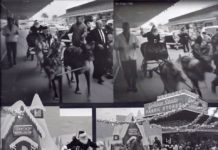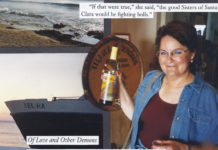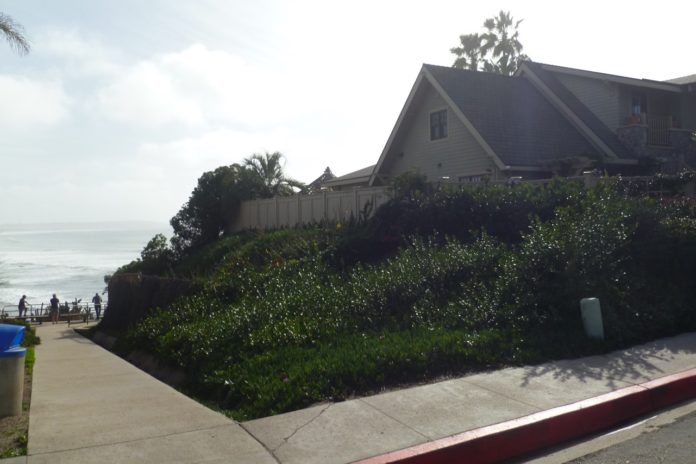
In 1953, in response to fervent anti-Communist feelings that swept the nation, the Cincinnati Reds baseball club officially changed its name to the Redlegs. Porkopolis fans would have to wait until 1959 to call their team the Reds again.
Later that year, the Head Red, Soviet Premier Nikita Khrushchev, blew his top when he wasn’t allowed to visit Disneyland during his trip to America. He did get to meet Marilyn Monroe, who told her maid, “He was fat and ugly and had warts on his face and he growled. Who would want to be a Communist with a president like that?”
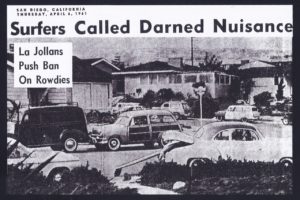
Then, in January 1961, an exaggerated salvo invoking the Red Scare was fired in the form of an inflammatory Letter to the Editor of the San Diego Union published under this headline: “All Parents Should Know of Red Menace.”
It was written by retired Navy dentist Captain Carl A. Schlack. He was referring to surfers.
Captain Schlack warned, “How parents (of surfers) may become or be unknowing tools of the Communist cause through lack of close supervision and control of their children. The laxity in discipline of children and juveniles…seem effective softening methods preparing youth for the acceptance of the communist doctrine. In general, the trend towards lack of self-discipline and disrespect for authority makes youth and many adults ripe for plucking by those who would undermine our way of life.”
The list of famous Commie surfers is short. As Robert Duvall noted in Apocalypse Now, “Charlie don’t surf.” The cleverly titled song, “Communist Surfers from Outer Space,” never made The Top Ten.
Among other things, Captain Schlack didn’t like “surf riders” dropping wax on his sidewalk. He complained that surfers poured gasoline on his lawn and burned it. They broke windows, destroyed gardens, irritated dogs, woke him at night and cut through his P.B. Point yard to reach the beach below.
But the path to the beach really wasn’t on his property…
Bowing to pressure from residents like Schlack, the city council voted in May 1961 to barricade the Linda Way easement that provided public beach access beside his Archer Street home. (Archer Street was later renamed Sea Ridge Drive.)
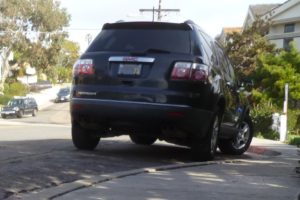
Even my own mother was concerned that my brother and I were being indoctrinated by communist professors. I tried to assure her that San Diego State College was not a hotbed of radical red insurrection in the early 1960s. Furthermore, I wasn’t cool and I wasn’t a wild surfer.
Because my younger brother, Andy, wanted to be cool, he became a surfer. Before he could afford a board, he made the back-end of a surfboard with a skeg to hang out of the trunk of his red ’49 Chevy convertible. The three letters in his license plate were “NKR.” A friend quipped that they stood for “Nikita Khrushchev’s Rod.” It wasn’t easy to be cool and live in Clairemont during the 1950s.
Today, Clairemont resident Patrick Bessie remembers angry encounters with the Navy captain at P.B. Point in the 1960s while he was in high school. “He didn’t allow surfers to wax their boards on the sidewalk outside his home. He didn’t own the sidewalk, but he acted like he did. We’d wax our boards on the path that led to the beach beside his home and he didn’t like that either,” said Bessie. “He was always hassling the surfers.”
The cold war between Schlack and the surf punks would last until his death in 1970, but détente, of sorts, was achieved in 1965 when Tourmaline Surfing Park, just south of Schlack’s home, was dedicated. It was a sixteen-year-old Clairemont High School surfer named Barry Adams who paddled north from the Western Regional Surfing Championships to accept the park from Mayor Frank Curran on behalf of the San Diego surfing community.
Was Carl Schlack a one-dimensional, right-wing wacko?
Dr. Schlack joined the Navy in 1936 and served as a dentist aboard several ships during World War II. In 1942, he wrote “A Short History of the United States Dental Corps” followed by a comprehensive “History of the Naval Dental Research” in 1948. His service record was impeccable.
Following his death, the Carl A. Schlack Award was created in his honor in 1971. It was presented annually “for unwavering dedication and excellence in dental research and post-doctoral education in the five Federal Medical Services.” In 2008, criteria for the award was altered slightly to include all dentists in FMS. None of the recipients contacted knew anything about Captain Schlack.
According to his published obituary, “… early surfers recall Schlack as an angry man who used to take pictures of them and spray them with his hose.”
Carl Schlack was a polarizing relic from the tempestuous early days of the San Diego surf wars. For those who considered him a crusty old salt, there were others who cheered the captain for his courageous stand against young anarchists and outlaws?
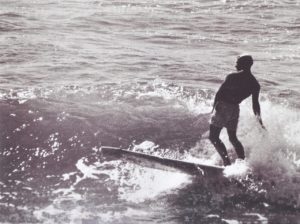
Skip Frye has become one of surfing’s senior statesmen. He remembers Captain Schlack as “hardcore.”
“They had the curbs painted red so there was no parking,” he recalled, “but I think it was another dentist who successfully challenged the legality of blocking the beach and the city backed him.”
Frye continued, “I’m older now and I understand where Captain Schlack was coming from. Young surfers back then could get an attitude. You have to respect the neighborhood and the neighbors. You don’t leave trash and cause problems. You keep it clean. I always try to leave the beach cleaner than when I got there.”
Next month in Squaremont, legendary surfboard pioneer Floyd Smith (Gordon & Smith Surfboards) will explain the history of surfing in Pacific Beach prior to the 1960s.
Email: Bill@ClairemontTimes.com
To read all the Squaremont columns, visit:

